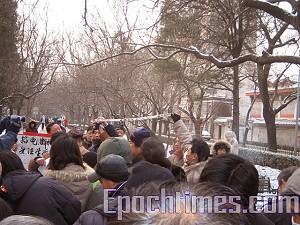More than 200 Beijing residents, whose homes were forcefully demolished, or whose property was seized by the state in what is known as “Jingzu” 1 , appealed to the Beijing Municipal government on January 21 because of damaged property. A reporter from the Associate Press (AP) interviewed several appellants, but was later driven from the scene by police.
Beijing resident Wang Jianping recounted how the AP reporter came to conduct interviews, as the appellants described their misfortune. Later two officers came out of the government building and confiscated the reporter’s identification.
“This reporter, David Hu, displayed documents authorizing permission to conduct interviews. But police said that he could only continue with his questioning after the officials had dealt with the appellants. Finally, the reporter took some photographs and left in a taxi, and the police followed him. We don’t know what happened to him after that,” said Wang.
A one-time resident of Beijing’s Xicheng District, Wang said that four years ago, without consent, her house was forcefully demolished by the Xicheng Court. She has been appealing for nearly three years but the problem still remains unresolved.
“I requested a photocopy of the administrative report, explained Wang, ”But the Xicheng Court wouldn’t provide it for me.” Later she tried taking her case to various officials but it didn’t seem to make any difference.
On September 27, 2006, in order to obtain an administrative report, Wang went to the Xicheng Court wearing clothes which had her grievance printed on them, and shouted slogans demanding her rights. That move got her detained for ten days at a local police station. When Wang was released, authorities told her that they would no longer deal with her case.
Wang was very critical of China’s services in this regard, adding that the country’s petition offices are almost nonexistent. “The public servants who work in the petition offices take tax payers’ money but don’t do anything to serve them,” she explained. “They lie, bribe and give irrelevant answers to questions and concerns. No one is held responsible there.”
In order to secure the Olympic Games in Beijing, the Chinese regime claimed that they would open up their previous limitations on foreign reporters. If people agree to be interviewed in China, foreign reporters supposedly no longer need to get authorization through the country’s propaganda department. Despite this promise, many foreign reporters are still largely constrained when conducting interviews in China.
[1] This term comes from a document issued by the Chinese Communist Party on January 18, 1956. This document requires that all privately owned houses located in the city should be “rented and operated by the state” for the benefit of national industrialization and socialist transformation, which is to say “houses are owned by the nation, and the nation rents, distributes and repairs them.”


